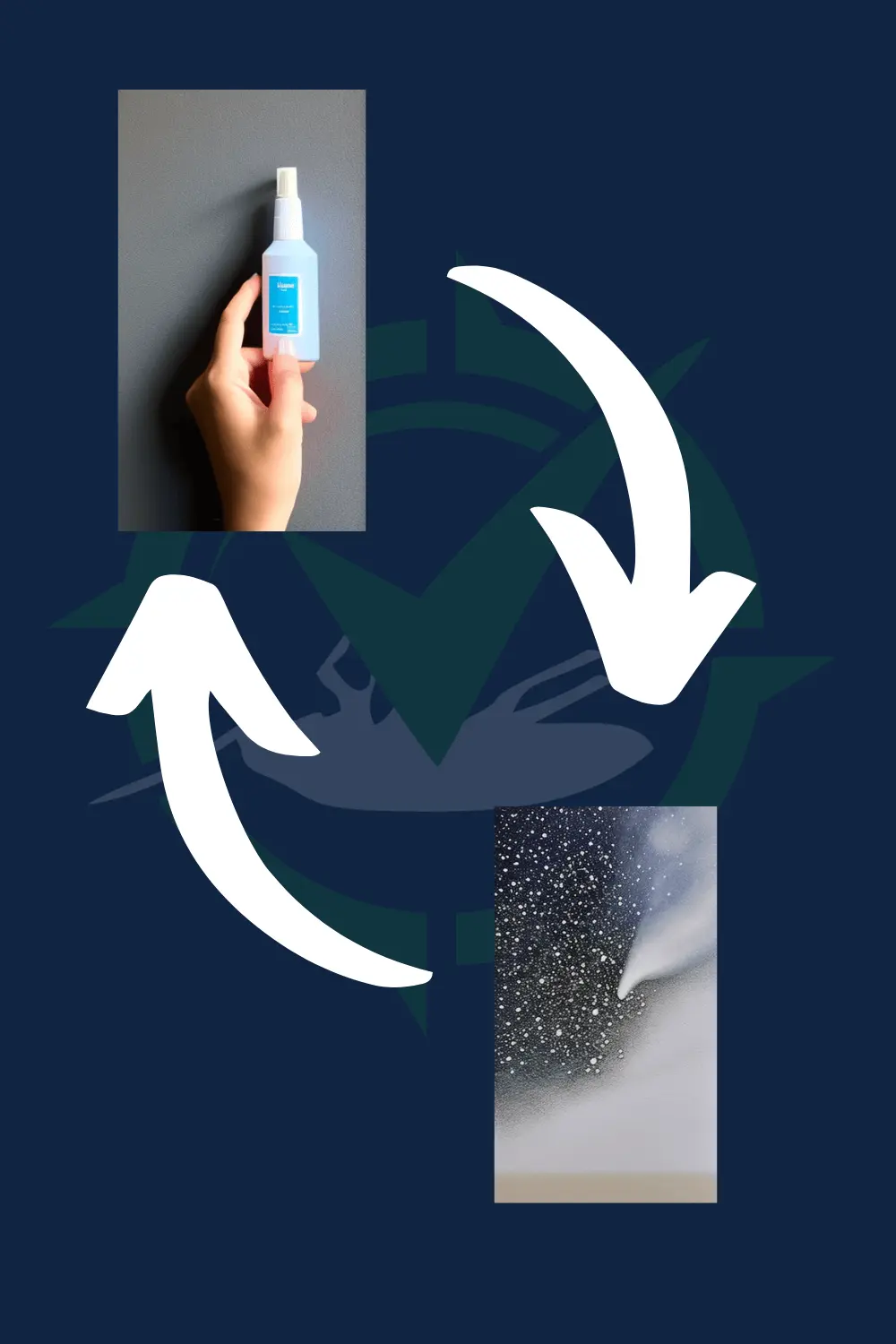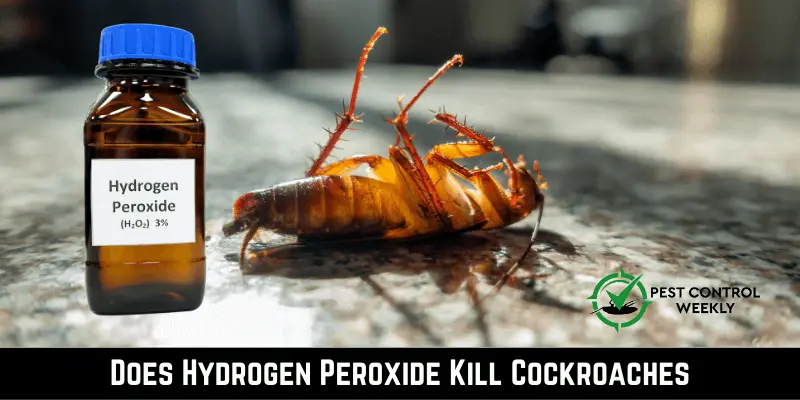Cockroaches are insects that like to live in dark and damp places. They prefer to conceal themselves in hard-to-reach or difficult-to-keep-clean locations. Most people can get rid of roaches at home with things like bleach, boric acid, and Listerine. Does hydrogen peroxide kill cockroaches?
Utilizing hydrogen peroxide provides an effective and odorless solution for exterminating cockroaches. A direct spray or pour into drains and pipes with a 3% hydrogen peroxide solution can quickly eliminate these pests. While hydrogen peroxide doesn’t attract roaches, it does offer a lethal environment for them. To increase its efficiency, consider adding boric acid into the mix, enhancing the pest-killing potential of this home remedy.
Hydrogen peroxide can be bought at any drugstore near you. In this blog, you will find out a lot about how to use hydrogen peroxide to get rid of cockroaches.
Hydrogen Peroxide and Its Uses
Hydrogen peroxide is an oxygen- and water-based chemical compound. Gaseous hydrogen peroxide is also present in the air in small amounts. Hydrogen peroxide is a mild antiseptic put on minor cuts, scrapes, and burns to keep them from getting infected. It can also rinse the mouth to get rid of mucus or soothe minor irritations.
Hydrogen peroxide also has a lethal effect on insects. According to the Ohio State University Extension, a great way to kill germs is to clean kitchen counters with undiluted hydrogen peroxide.
According to the CDC, hydrogen peroxide can kill microorganisms and clean your bathroom. The Environmental Working Group recommends hydrogen peroxide as an excellent way to eliminate stains.
How Effective Is Hydrogen Peroxide Against Pests?
Hydrogen peroxide has not been proven to be an effective insecticide against all insects. But it does kill most insects and their eggs, except for insect pests.
Hydrogen peroxide can also kill mildew and yeast. It helps rid homes of aphids, mites, mealybugs, and the larvae of fungus gnats. A small amount of hydrogen peroxide will also quickly kill cutworms, gnat larvae, and fungus on the outside of the body.
To get rid of insect pests, mix a 1:1 ratio of hydrogen peroxide and water and spray the leaves and stems daily for a week. Then cut the treatment back to once a week. It is also used as a fungicide spray by combining 4 teaspoons of hydrogen peroxide with 1 gallon of water.
What Will You Need To Make A Cockroach-Killing Hydrogen Peroxide Solution?
You won’t need anything more than a spray bottle, a solution of 3% hydrogen peroxide, dishwashing liquid, a measuring cup, rubber gloves, and a broom and scrub brush to kill them with hydrogen peroxide.
Mix an equal ratio of hydrogen peroxide and water in a spray bottle and spray the mixture in the areas where you want to kill them. If you pour a variety on a ceiling or outside and there is wind, be careful because the mixture can blow back into your eyes. This is why you should wear safety glasses or a mask while doing it.
Moisture is a sign of a cockroach because they need it to survive. So it makes sense that their search for water will lead them even to the cleanest homes. These insects are attracted to dripping faucets and leaking pipes among other things.
How To Make Hydrogen Peroxide Solution To Completely Eradicate Cockroaches?
This is how you can make hydrogen peroxide solution to kill roaches:

- Hydrogen peroxide is readily available for purchase at any of the local pharmacies.
- You can use 3% of hydrogen peroxide diluted to the same concentration as water.
- The insect-killing hydrogen peroxide solution can be poured into a sprayer and sprayed on targeted areas.
- Suppose you find that your solution is ineffective against your cockroaches. In that case, you can double the amount of hydrogen peroxide that in the mixture to make it more potent.
How To Kill Cockroaches with Other Drain Killers?
Hydrogen Peroxide
For a simple and effective solution, pour a whole bottle of hydrogen peroxide down the drain, allowing it to sit and foam for several minutes. This action often breaks down most clogs and exposes any roaches traveling or nesting in the pipes to the chemicals. The result is that the roaches either die or are forced to find a new place to inhabit.
Bleach
If your home is on a public sewer line and doesn’t rely on a septic tank for waste removal, pouring a cup of bleach down the drain can be an effective method to kill any present roaches. However, keep in mind that bleach not only exterminates roaches but also kills beneficial composting microbes in sewer systems. This can potentially lead to waste build-up and even damage local waterways and wildlife.
White Vinegar
White vinegar can be a powerful tool in your pest control arsenal. Pour several cups of vinegar down a drain to use its natural acidity to dissolve clogs and deter pests. For an added bonus, combine vinegar with baking soda. This mixture creates a chemical reaction that enhances its clog-clearing capabilities. This method not only kills drain roaches but also eliminates their food sources within the pipes, helping to prevent a future roach invasion.
Boric Solution
A boric solution can be a highly effective roach deterrent. Pour it down your kitchen sink to create an environment that roaches find inhospitable. The boric acid kills roaches on contact, and any powder that dries on the sides of the pipe will continue to exterminate roaches until it is washed away.
Drain Cleaner
If roaches have taken up residence in your bathroom drains, a high-powered drain cleaner can be a quick and potent solution. These cleaners can clear even the worst clogs, and the heavy load of chemicals they contain is lethal to roaches. They also make the pipes a hostile environment for cockroaches for several weeks.
Hot Water
Keeping a clean kitchen is the first line of defense against pests. Running hot water regularly should be enough to keep your pipes free of pests and maintain adequate insect control. If you start to see signs of roaches, consider adding vinegar or a baking soda combination to make the hot water treatment even more effective.
Does Hydrogen Peroxide Attract Cockroaches?
No, cockroaches aren’t attracted to hydrogen peroxide. It is possible to repel cockroaches with hydrogen peroxide. It is effective in eliminating roaches. The smell of food brings cockroaches into your home.
Cockroaches like starch, sugar, beef, pork, and cheese the most. These are also drawn to the smell of rotting food, which can be especially strong if the food is a fruit or vegetable.
Roaches are also attracted to trash and grease on stovetops and countertops, and they can also get into stored food. These insects have a natural propensity to be drawn to dimly lit, humid, and warm environments.
Summing Up
Moisture indicates the presence of cockroaches. So it makes sense that they would go even to the cleanest homes in search of water. This is one of the main reasons you see them in washing rooms, shower rooms, and kitchens. Cockroaches are hard to get rid of, but you can do it quickly and effectively with hydrogen peroxide.
If you pour hydrogen peroxide on a roach, it will slowly dissolve the hinges between the hard plates of the roach’s exoskeleton. You can use 3% of hydrogen peroxide diluted to the same concentration as water.
References
Andrés CMC, Pérez de la Lastra JM, Juan CA, Plou FJ, Pérez-Lebeña E. Chemistry of Hydrogen Peroxide Formation and Elimination in Mammalian Cells, and Its Role in Various Pathologies. Stresses. 2022; 2(3):256-274
CDC- Guideline for Disinfection and Sterilization in Healthcare Facilities (2008)
Häcker I, Koller R, Eichner G, Martin J, Liapi E, Rühl J, Rehling T, Schetelig MF. Evaluation of Hydrogen Peroxide Fumigation and Heat Treatment for Standard Emergency Arthropod Inactivation in BSL-3 Insectaries. Front Bioeng Biotechnol. 2020 Nov 16;8:602937

